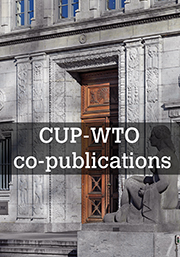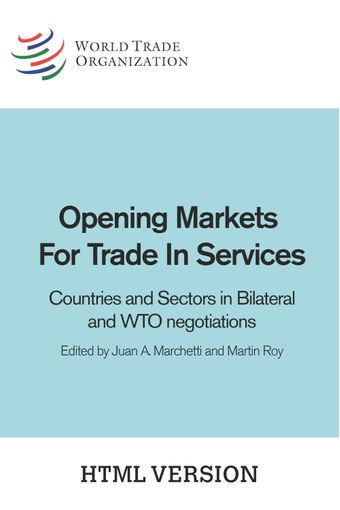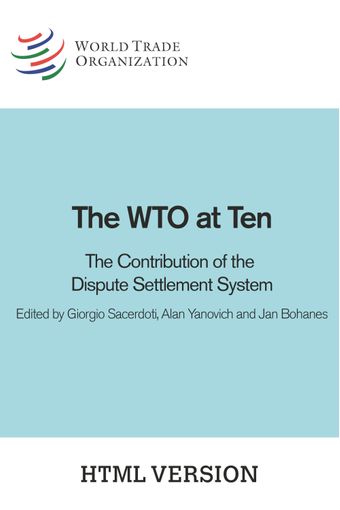- Home
- Collections
- CUP co-publications
CUP co-publications

Collection Contents
21 - 34 of 34 résultats
-
-
Domestic regulation of retail food distribution services in Israel: The missing link between food prices and social protest
Plus MoinsAuthors: Tomer BroudeThis chapter provides a case study tracing the impact of domestic regulation on market structure in the retail distribution services sector and its ultimate effects on consumer food prices. Taking Israel, a small and relatively liberalized Organisation for Economic Co-operation and Development (OECD) economy, as an example, our research investigates whether market concentration and the absence of international competition can be attributed to domestic regulation. We place this discussion in the context of recent consumer-led social protest against the rising cost of food in Israel.
-
-
-
WTO Domestic Regulation and Services Trade
Plus MoinsAuthors: Aik Hoe Lim and Bart De MeesterDomestic regulation of services sectors has a significant impact on services trade liberalization, which is why General Agreement on Trade in Services (GATS) disciplines are negotiated in the WTO. With the help of analyses and case-studies from academics, regulators and trade experts, this book explores the scope and limits of WTO legal principles to promote domestic regulatory reform. Case-studies discuss country-specific challenges and experiences of regulating important service sectors, such as finance, telecommunications, distribution, legal, education, health, postal and logistics services, as well as the role of regulatory impact assessments. The findings will interest trade officials, policy-makers, regulators, think tanks and businesses concerned with the implications of domestic regulation on access to services markets, and with the opportunities for formulating trade disciplines in this area. It is also a useful resource for academics and students researching regulatory approaches and practices in services sectors.
-
-
-
Multilateralizing Regionalism
Plus MoinsAuthors: Richard Baldwin and Patrick LowRegional trade agreements (RTAs) have proliferated around the world in the past two decades, and now nearly all members of the WTO are party to at least one. Besides tariffs and rules of origin regulating trade in goods, many RTAs now include provisions on services, investments, technical barriers to trade and competition rules, as well as a host of issues not directly related to trade. The geographic reach of RTAs is expanding, with transcontinental agreements spreading forcefully alongside intra-regional agreements. ‘Multilateralizing Regionalism’ was the title of a major conference held from 10–12 September 2007 at the WTO in Geneva. Brought together in this publication, the conference papers achieve two things. First, they marshall detailed, new empirical work on the nature of the ‘Spaghetti Bowl’ and the problems it poses for the multilateral trade system. Second, they contribute fresh and creative thinking on how to ‘tame the tangle’ of regional trade agreements.
-
-
-
Opening Markets for International Trade in Services
Plus MoinsAuthors: Juan A. Marchetti and Martin RoyA unique comparison of how service trade negotiations have evolved on the regional/bilateral level and at the WTO.
-
-
-
Risk Assessment in the International Food Safety Policy Arena
Plus MoinsTwo institutions provide multilateral venues for countries to discuss food safety measures at the international level: the Codex Alimentarius Commission (Codex) and the World Trade Organization. Both institutions encourage their members to base food safety standards on scientific evidence. In this paper we provide a description of how food safety related scientific evidence is generated and how it is used in the context of risk assessment for international standard-setting at CODEX and in WTO trade disputes. In particular, we discuss the processes leading to policy conclusions on the basis of scientific evidence, with a focus on the interactions involved between private and public sector actors and those between “scientific experts” and others. We identify weaknesses in the current institutional set-up and provide suggestions on how to improve the interaction between different players at the national and international level so as to strengthen the existing system and increase its cost efficiency.
-
-
-
A Handbook on Accession to the WTO
Plus MoinsDe : Peter John WilliamsThe Handbook provides the first detailed explanation and analysis of the process whereby governments become Members of the WTO. The WTO Agreement, which came into force on 1 January, 1995, provides few details on how this process is to take place. Consequently, the steps in the detailed negotiations leading up to access have evolved through the actual negotiations for governments which have become Members of the WTO since 1995. This handbook is unique in providing an account of how the process evolved and in offering details on the process as it is now applied. Moreover, the input of the WTO Secretariat into the preparation of the guide provides information not available until now to anyone outside the Secretariat. The Secretariat has supported production of this handbook in the hope it will serve as a useful source of reference for officials from acceding governments, WTO Members, academia, and the general public.
-
-
-
Dictionary of Trade Policy Terms, 5th edition
Plus MoinsThis is an accessible guide to the vocabulary used in trade negotiations. It explains about 2,500 terms and concepts in simple language. Its main emphasis is on the multilateral trading system represented by the agreements under the World Trade Organization (WTO). In addition it covers many of the trade-related activities, outcomes and terms used in other international organizations, such as the United Nations Conference on Trade and Development (UNCTAD), the World Intellectual Property Organization (WIPO), the Food and Agriculture Organization (FAO) and the OECD. The last five years have seen a rapid spread in the formation of free-trade areas in all parts of the world. This dictionary allocates generous space to the vocabulary associated with such agreements. It offers clear explanations, for example, of the concepts used in the administration of preferential rules of origin. Additional areas covered include emerging trade issues and issues based particularly on developing-country concerns.
-
-
-
The WTO in the Twenty-First Century
Plus MoinsAuthors: Yasuhei Taniguchi, Alan Yanovich and Jan BohamesTrois questions importantes seront déterminantes pour l'avenir de l'OMC: le règlement des différends, les négociations et l'intégration régionale. Le règlement des différends est généralement considéré comme l'un des succès majeurs de l'OMC durant ses dix premières années d'existence. La conclusion des négociations du Cycle de Doha est l'un de ses principaux défis. L'intégration régionale est désormais au premier plan du débat alors que les accords régionaux prolifèrent et que les décideurs et les universitaires prennent la mesure de leur incidence sur le système commercial multilatéral. Ces questions, et leur interaction, sont traitées par d'éminents spécialistes et professionnels du droit commercial international originaires d'Amérique du Nord, d'Europe et de la région Asie Pacifique. En outre, des sections spécifiques sont consacrées à la région Asie Pacifique, à sa participation au règlement des différends et aux négociations dans le cadre de l'OMC, et aux tendances récentes à une plus grande intégration régionale.AE1:AE10
-
-
-
The WTO at Ten
Plus MoinsAuthors: Giorgio Sacerdoti, Alan Yanovich and Jan BohanesBringing together articles by some of the leading policy-makers, including previous WTO Director-Generals, practitioners, scholars of international trade law, government officials, international civil servants, Members of the WTO Appellate Body, and judges from a number of international tribunals, this volume assesses the dispute settlement system during the first ten years of the World Trade Organization. It examines the relationship and balance between political governance and dispute settlement; the functioning of the dispute settlement procedures and various reform proposals; the contribution of the Appellate Body to the development of international trade law; and treaty interpretation in a number of international dispute settlement fora such as the WTO, the International Court of Justice, the European Court of Justice, and the Tribunal for the Law of the Sea. The book has its origins in a series of events commemorating the tenth anniversary of the creation of the WTO dispute settlement system and the Appellate Body.
-
-
-
The First Ten Years of the WTO
Plus MoinsDe :This book was commissioned by the World Trade Organization (WTO) as a factual account of the first decade of its existence. It aims to cover the principal activities of the WTO as the successor to GATT and the steps taken to establish a global trading system. Peter Gallagher, the author, is an independent trade analyst and consultant, who records what might be regarded as the WTO's main achievements as well as describing the controversies that have arisen in its first ten years. A useful reference book for policy makers, journalists, members of trade delegations and for everyone who requires a detailed understanding of the workings of the WTO.
-
-
-
Key Issues in WTO Dispute Settlement
Plus MoinsAuthors: Rufus Yerxa and Bruce WilsonThis book examines aspects of the operation of the WTO dispute settlement system during the first ten years of the WTO. It covers a representative cross-section of the issues and situations WTO Members have dealt with under the Dispute Settlement Understanding. The book is unique in that it includes contributions from virtually the entire gamut of actors involved in the day-to-day operation of the WTO dispute settlement system: Member government representatives, private lawyers who litigate on behalf of Member governments in the system, Appellate Body members, Appellate Body Secretariat staff, and WTO Secretariat staff. It also includes contributions from several academics who closely follow and carefully scrutinize all that goes on within the system. It therefore provides fascinating insights into how the system has operated in practice, and how the lessons of the first decade can be applied to make the system even more successful in the years to come.
-
-
-
The WTO Dispute Settlement Procedures, 3rd Edition
Plus MoinsThe third edition of The WTO Dispute Settlement Procedures collects together the treaty texts, decisions and agreed practices relating to the procedures that apply in the settlement of WTO disputes. It affords ready answers to technical questions relating to matters such as: how disputes are initiated and conducted, including at the appellate stage; what deadlines apply and how to calculate them; what rules of conduct bind individuals involved in WTO dispute settlement; and what rules of procedure apply to meetings of the Dispute Settlement Body. This highly practical work, which includes cross-references and a subject index, will prove invaluable to anyone working in WTO dispute settlement, including lawyers, civil servants working in the field of trade, economists, academics and students. This edition has been fully updated to take account of revised rules and procedures.
-
-
-
A Handbook on the WTO Dispute Settlement System
Plus MoinsDe : Antony TaubmanThe primary purpose of this training guide is to explain the WTO dispute settlement system to an interested person with little or no knowledge of how this system functions. However, with its detailed content, it could also serve as a very useful “handbook” to experienced practitioners of WTO Law. It explains the historic evolution of the current system and explores the practices that have arisen in its operation since its entry into force on 1 January 1995.
-
-
-
A Handbook on Anti-Dumping Investigations
Plus MoinsAuthors: Judith Czako, Johann Human and Jorge MirandaA key guide to the intricacies of anti-dumping proceedings
-
















